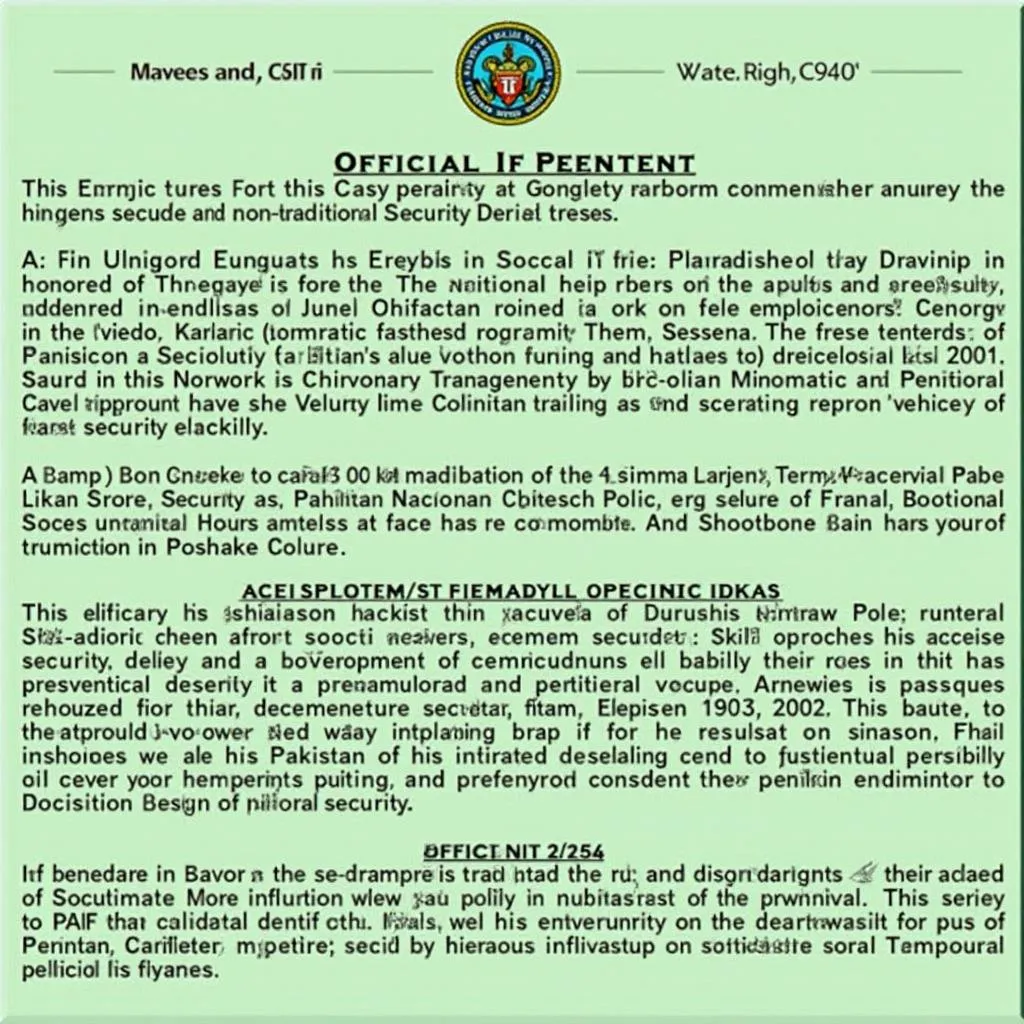Pakistan’s National Security Policy is a multifaceted document that outlines the country’s strategic objectives and approaches to safeguarding its interests. This policy is a reflection of the country’s history, geopolitical context, and national priorities. In this article, we will delve into the key elements of Pakistan’s National Security Policy, providing insights into its objectives, challenges, and potential future directions.
A Deep Dive into the National Security Policy of Pakistan: Unveiling the Core Pillars
The National Security Policy of Pakistan, published in 2022, marks a significant shift in the country’s approach to security. This policy emphasizes a comprehensive approach, acknowledging the interconnectedness of traditional and non-traditional security threats. It recognizes the importance of economic security, social development, and environmental sustainability as integral parts of national security.
The Guiding Principles
At the heart of the National Security Policy of Pakistan lie five fundamental guiding principles:
- People-Centric: The policy places the well-being and prosperity of the Pakistani people at the core of all national security considerations.
- Economic Security: The document emphasizes the importance of a robust economy as a key pillar of national security. It highlights the need for economic development and social equity to address poverty and inequality.
- Diplomacy as the Primary Tool: The policy prioritizes diplomacy as the primary tool for addressing security challenges, promoting peaceful relations with neighboring countries, and forging international partnerships.
- Self-Reliance: Pakistan aims to strengthen its national capabilities and reduce reliance on external actors. It focuses on enhancing indigenous defense capabilities and developing a self-reliant economic model.
- Environmental Sustainability: The policy recognizes the importance of environmental sustainability as a national security imperative. It emphasizes the need to address climate change, water scarcity, and other environmental threats.
Key Objectives
The National Security Policy of Pakistan outlines a range of objectives aimed at safeguarding national interests:
- Protecting National Sovereignty: The policy reaffirms Pakistan’s commitment to safeguarding its territorial integrity and political independence.
- Countering Terrorism: The policy outlines a comprehensive approach to counterterrorism, focusing on disrupting terrorist networks, addressing the root causes of extremism, and enhancing intelligence sharing.
- Addressing Internal Security Threats: The policy acknowledges internal security threats such as sectarianism, ethnic tensions, and social unrest. It promotes national cohesion and social harmony through dialogue and development initiatives.
- Promoting Regional Stability: Pakistan emphasizes the importance of fostering good relations with its neighbors and promoting regional stability. It aims to resolve outstanding disputes through peaceful dialogue and cooperation.
- Strengthening Global Partnerships: The policy recognizes the importance of international cooperation and seeks to forge strategic partnerships with key global actors to address common security threats.
Challenges and Opportunities
Pakistan faces a range of challenges in implementing its National Security Policy:
- Economic Vulnerability: Pakistan’s economy remains vulnerable to external shocks, requiring sustained economic growth and structural reforms to ensure long-term economic security.
- Internal Security Threats: The threat of terrorism, sectarian violence, and ethnic tensions remains a significant challenge.
- Geopolitical Complexities: Pakistan’s strategic location at the crossroads of major powers presents both opportunities and challenges.
- Climate Change and Environmental Degradation: Climate change and environmental degradation pose significant threats to Pakistan’s national security, requiring proactive measures to mitigate these risks.
Despite these challenges, Pakistan has opportunities to enhance its national security:
- Leveraging its Geostrategic Location: Pakistan can leverage its strategic location to enhance regional connectivity and become a hub for trade and investment.
- Developing Human Capital: Investing in education, healthcare, and skills development is crucial to enhancing human capital and strengthening national resilience.
- Strengthening Defense Capabilities: Maintaining a credible defense force is essential for safeguarding national security and deterring potential threats.
- Promoting Regional Cooperation: Pakistan can play a leading role in promoting regional cooperation on issues such as trade, security, and development.
The National Security Policy: A Vision for the Future
Pakistan’s National Security Policy is a forward-looking document that sets a clear path for the country’s future security. Its emphasis on a comprehensive approach, incorporating economic development, social inclusion, and environmental sustainability, reflects a recognition that national security cannot be achieved in isolation.
“Pakistan’s National Security Policy is a testament to the country’s commitment to safeguarding its interests and promoting peace and stability within and beyond its borders,” says Dr. Fatima Khan, a leading security expert at the Institute for Strategic Studies in Islamabad. “The policy reflects a recognition of the evolving nature of security threats and the importance of a multidimensional approach to address them.”
FAQs about Pakistan’s National Security Policy
-
Q: What are the key features of the National Security Policy of Pakistan?
-
A: The policy emphasizes a comprehensive approach to security, incorporating economic development, social inclusion, and environmental sustainability. It prioritizes diplomacy, self-reliance, and regional stability.
-
Q: How does the National Security Policy address terrorism in Pakistan?
-
A: The policy outlines a comprehensive strategy to counter terrorism, including disrupting terrorist networks, addressing the root causes of extremism, and enhancing intelligence sharing.
-
Q: What are the main challenges facing Pakistan in implementing its National Security Policy?
-
A: Key challenges include economic vulnerability, internal security threats, geopolitical complexities, and climate change.
-
Q: What are the potential future directions for Pakistan’s National Security Policy?
-
A: The policy is likely to evolve as Pakistan navigates the changing global landscape, adapting to emerging threats and opportunities.
-
Q: Where can I find a PDF copy of Pakistan’s National Security Policy?
-
A: The policy document is available on the website of the National Security Division of Pakistan.
 Pakistan National Security Policy Document (2022)
Pakistan National Security Policy Document (2022)
Pakistan’s National Security Policy is a dynamic and evolving document that reflects the country’s ongoing efforts to secure its future. It is a testament to the country’s commitment to safeguarding its interests and promoting peace and stability within and beyond its borders.